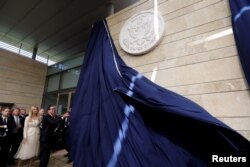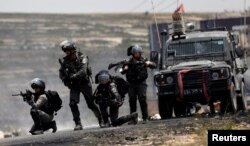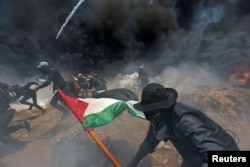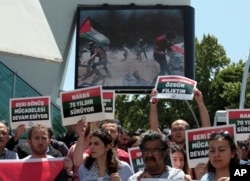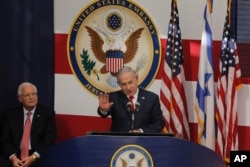Thousands of Palestinian mourners rallied in Gaza Tuesday at funerals for the first of dozens of protesters killed in border clashes with Israeli security forces, an assault U.N. human rights officials condemned as "appalling."
Many of the mourners waved Palestinian flags and some called for revenge against Israel for the 60 who were killed and the 2,700 wounded on Monday. Mourners walking to two funerals in southern Gaza shouted, "With souls and blood we redeem you martyrs!"
New protests broke out along the Gaza border with Israel and in the West Bank, with demonstrators hurling rocks at the Israelis and setting fires as Israeli forces fired tear gas in response. But the number of protesters appeared to number in the hundreds at several locations, substantially smaller than the 40,000 who demonstrated along the Gaza border Monday in opposition to the opening of the new U.S. embassy in Jerusalem less than 100 kilometers away. At least two Palestinians were reported killed on Tuesday.
Israeli Prime Minister Benjamin Netanyahu defended the Jewish state's right to defend its border, but faced a growing international outcry for its use of live fire against the Palestinian protesters. The United States, however, blamed the militant Hamas group that administers Gaza for setting off the protests and blocked a United Nations Security Council statement calling for an investigation of the Palestinian deaths.
But U.N. human rights officials assailed Israel for its use of firepower against the protesters.
Michael Lynk, the U.N. special rapporteur on human rights in the Occupied Palestinian Territory, said in a statement, "This blatant excessive use of force by Israel -- 'an eye for an eyelash' -- must end, and there must be true accountability for those in military and political command who have ordered or allowed this force to be once again employed at the Gaza fence."
The U.N. human rights office said, "It seems anyone is liable to be shot dead or injured: women, children, press, first responders, bystanders, and at almost any point up to 700 meters from the fence."
Numerous governments called for an independent investigation of Monday's carnage.
Belgian Prime Minister Charles Michel linked the violence to the U.S. moving its embassy from Tel Aviv to Jerusalem, even as most governments with diplomatic ties to Israel have kept their embassies in Tel Aviv and condemned the U.S. action ordered by President Donald Trump.
Guatemala on Wednesday followed the U.S. move by opening its own embassy in Jerusalem.
Ireland's foreign ministry summoned the Israel ambassador to Dublin to express its "shock and dismay" at the bloodshed along the Gaza border, while South Africa recalled its ambassador from Israel.
Germany called for an independent investigation, saying the violence "concerns us greatly and it's terrible that so many people lost their lives, including minors." But government spokesman Steffen Seibert also blamed Hamas, saying it was "trying to escalate the violence. That is cynical."
Turkey lowered its flags to half-mast to mark three days of mourning and said it was willing to take in wounded Palestinians.
Turkish President Recep Tayyip Erdogan accused Israel of "state terror" and "genocide." But Netanyahu rebuked the Turkish leader, saying, "Erdogan is one of the biggest supporters of Hamas, so there's no doubt he's an expert on terror and slaughter. I'd suggest he doesn't preach morality to us."
Netanyahu said on Twitter Monday every country is obligated to defend its borders.
"The Hamas terrorist organization declares it intends to destroy Israel and sends thousands to breach the border fence in order to achieve this goal. We will continue to act with determination to protect our sovereignty and citizens," he said.
Monday's clashes occurred as U.S. and Israeli officials celebrated the opening of the new U.S. Embassy in Jerusalem.
Along with rejecting the U.S. Embassy move, Palestinians are protesting to mark the anniversary of what they call the "nakba" or "catastrophe" in reference to the hundreds of thousands of Palestinians who were expelled or fled during the 1948 war surrounding Israel's creation.
Palestinian President Mahmoud Abbas called the Israeli actions "massacres."





